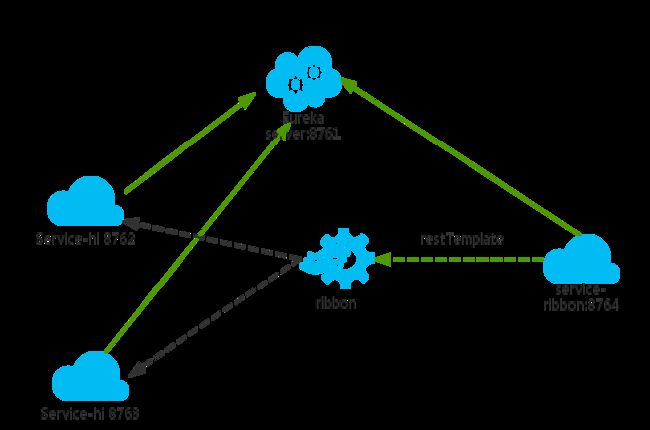SpringCloud教程-服务消费者(rest+ribbon)(Finchley版本)
在微服务架构中,业务都会被拆分成一个独立的服务,服务与服务的通讯是基于http restful的。Spring cloud有两种服务调用方式,一种是ribbon+restTemplate,另一种是feign。这里讲解下基于ribbon+rest。
一、ribbon简介
Ribbon is a client side load balancer which gives you a lot of control
over the behaviour of HTTP and TCP clients. Feign already uses Ribbon,
so if you are using @FeignClient then this section also applies。
-----摘自官网
ribbon是一个负载均衡客户端,可以很好的控制htt和tcp的一些行为。Feign默认集成了ribbon。
-
ribbon 已经默认实现了这些配置bean:
-
IClientConfig ribbonClientConfig: DefaultClientConfigImpl
-
IRule ribbonRule: ZoneAvoidanceRule
-
IPing ribbonPing: NoOpPing
-
ServerList ribbonServerList: ConfigurationBasedServerList
-
ServerListFilter ribbonServerListFilter: ZonePreferenceServerListFilter
-
ILoadBalancer ribbonLoadBalancer: ZoneAwareLoadBalancer
二、准备工作
这一篇文章基于上一篇文章的工程,启动eureka-server 工程;启动service-hi工程,它的端口为8762;将service-hi的配置文件的端口改为8763,并启动,这时你会发现:service-hi在eureka-server注册了2个实例,这就相当于一个小的集群。
如何在idea下启动多个实例,请参照这篇文章:
https://blog.csdn.net/Number_oneEngineer/article/details/86489040

三、建一个服务消费者
重新新建一个spring-boot工程,取名为:service-ribbon;
在它的pom.xml继承了父pom文件,并引入了以下依赖:
4.0.0
com.forezp
service-ribbon
0.0.1-SNAPSHOT
jar
service-ribbon
Demo project for Spring Boot
com.forezp
sc-f-chapter2
0.0.1-SNAPSHOT
org.springframework.cloud
spring-cloud-starter-netflix-eureka-client
org.springframework.boot
spring-boot-starter-web
org.springframework.cloud
spring-cloud-starter-netflix-ribbon
在工程的配置文件指定服务的注册中心地址为http://localhost:8761/eureka/,程序名称为 service-ribbon,程序端口为8764。配置文件application.yml如下:
eureka:
client:
serviceUrl:
defaultZone: http://localhost:8761/eureka/
server:
port: 8764
spring:
application:
name: service-ribbon
在工程的启动类中,通过@EnableDiscoveryClient向服务中心注册;并且向程序的ioc注入一个bean: restTemplate;并通过@LoadBalanced注解表明这个restRemplate开启负载均衡的功能。
@SpringBootApplication
@EnableEurekaClient
@EnableDiscoveryClient
public class ServiceRibbonApplication {
public static void main(String[] args) {
SpringApplication.run( ServiceRibbonApplication.class, args );
}
@Bean
@LoadBalanced
RestTemplate restTemplate() {
return new RestTemplate();
}
}
写一个测试类HelloService,通过之前注入ioc容器的restTemplate来消费service-hi服务的“/hi”接口,在这里我们直接用的程序名替代了具体的url地址,在ribbon中它会根据服务名来选择具体的服务实例,根据服务实例在请求的时候会用具体的url替换掉服务名,代码如下:
@RestController
public class testone {
private static final String HttpName = "https://product";
@Autowired
private ConfigBean configBean;
@RequestMapping()
public String test() {
return configBean.restTemplate().getForObject(HttpName + "/zzk", String.class);
}
}
写一个controller,在controller中用调用HelloService 的方法,代码如下:
@RestController
public class HelloControler {
@Autowired
HelloService helloService;
@RequestMapping("/zzk")
public String test(){
return "你正在访问第一个数据库哈哈哈!!!";
}
}
@RestController
public class HelloControler {
@Autowired
HelloService helloService;
@RequestMapping("/zzk")
public String test(){
return "你正在访问第二个数据库哈哈哈!!!";
}
}
在浏览器上多次访问http://localhost:8764/product/zzk,浏览器交替显示:
你正在访问第一个数据库哈哈哈!!!
你正在访问第二个数据库哈哈哈!!!
这说明当我们通过调用restTemplate.getForObject(HttpName + “/zzk”, String.class)方法时,已经做了负载均衡,访问了不同的端口的服务实例。
四、此时的架构
- 一个服务注册中心,eureka server,端口为8761
- service-hi工程跑了两个实例,端口分别为8762,8763,分别向服务注册中心注册
- sercvice-ribbon端口为8764,向服务注册中心注册
- 当sercvice-ribbon通过restTemplate调用service-hi的hi接口时,因为用ribbon进行了负载均衡,会轮流的调用service-hi:8762和8763 两个端口的hi接口;
原创:https://www.fangzhipeng.com/springcloud/2018/08/30/sc-f2-ribbon/